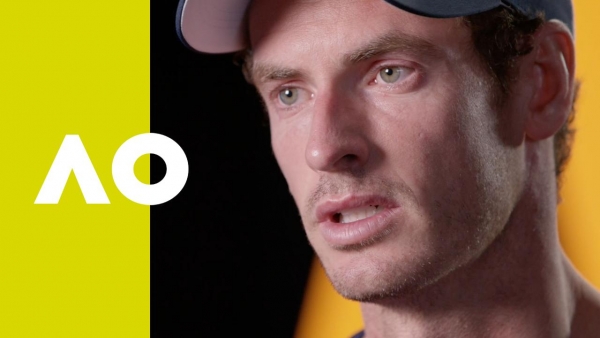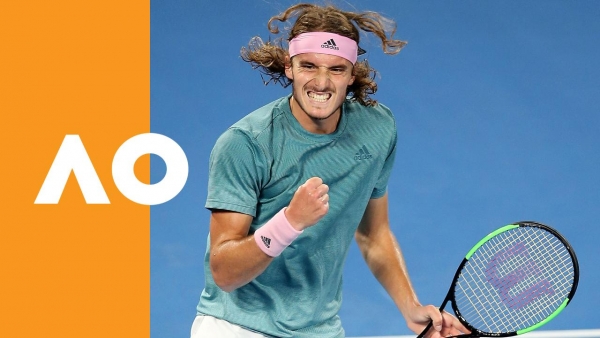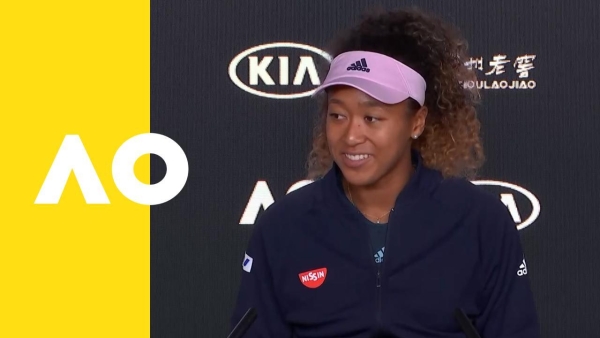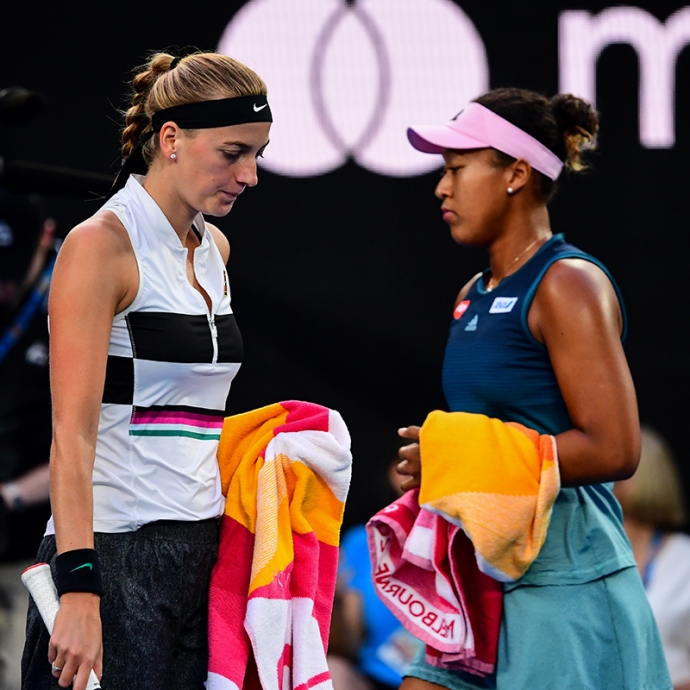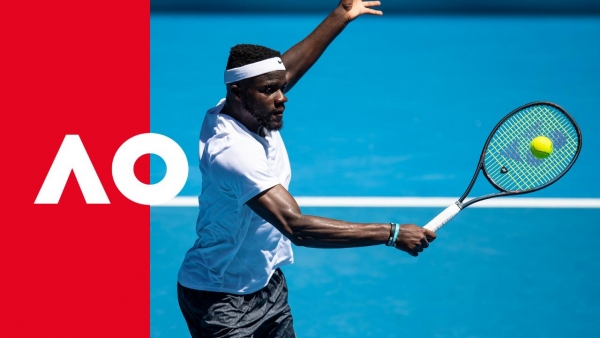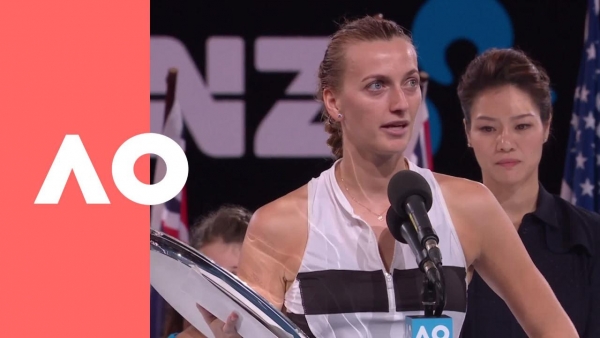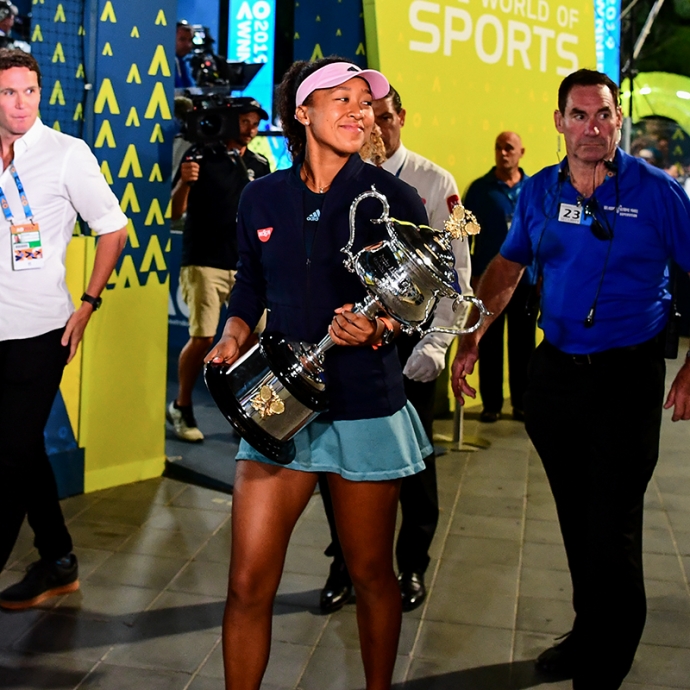1. We may have seen the last of Andy Murray
Andy Murray’s tearful announcement on the Friday before the tournament that he can no longer play with ongoing pain in his damaged right hip, a year on from his surgery, prompted a flood of affectionate tributes from players of all eras.
Most will miss Murray the man more than the player. The five-time Australian Open finalist has set a playing end-date of Wimbledon, by which time he’ll be 32, but acknowledges he may not make it that far.
MORE: Murray’s 10 most memorable Melbourne moments
Murray’s last stand at Melbourne Park was a typically defiant fight, coming from two sets down to extend Roberto Bautista Agut to 6-2 in the fifth set. Melbourne Arena echoed with his agonised cries as he willed himself into the contest and in pursuit of balls many other players would deem unreachable.
“If today was my last match, it was a brilliant way to finish,” Murray told an emotional crowd, which included his mum Judy and doubles champion brother Jamie.
In the most top-heavy era in men’s tennis, Murray’s career – as a three-time major winner, dual Olympic gold medallist, Davis Cup winner and world No.1 – was all about reaching the unreachable. The father of two daughters, Murray’s hope is not for more tennis titles but daily life – like putting on shoes and socks – without pain.
2. We glimpsed a future without Federer
Stefanos Tsitsipas ignited the tournament with his fourth-round 6-7(11) 7-6(3) 7-5 7-6(5) upset of titleholder Roger Federer. The 20-year-old Greek played with such style and soul against the 20-time major winner – much like a younger Federer in fact, with his flowing single-handed backhand and athletic net-play – that his performance here in reaching the semifinals takes some of the sting out of the losing the 37-year-old superstar Swiss.
3. Serena Williams is not over the trauma of the US Open
Serena Williams was beyond magnanimous in her quarterfinal loss to Karolina Pliskova, from 5-1 and four match points up in the final set. Although she jarred her left ankle on her first match point and didn’t win a point on serve for the rest of the match, the seven-time champion refused to cite injury for her defeat, giving her hard-swinging opponent all the credit.
MORE: Pliskova stuns Williams in quarterfinal upset
Signs that Serena was overcompensating for her torrid US Open, when the controversy of her final meltdown overwhelmed Naomi Osaka’s winning moment, and she faced a firestorm of criticism.
Winning against Pliskova would have meant a semifinal rematch with Osaka. The internet would have blown up.
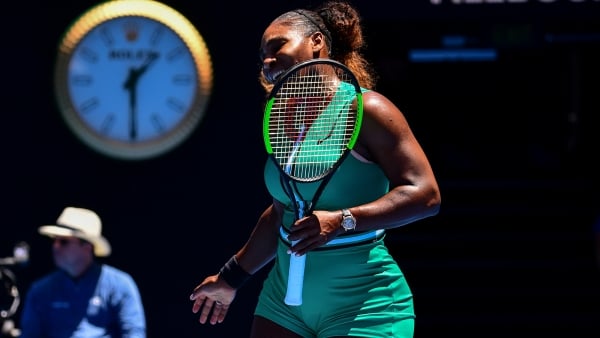
4. Naomi Osaka is a comedian
Newbie Grand Slam champions are more renowned for bombing than backing up in their next major. Naomi Osaka is the first maiden major winner to double up since Jennifer Capriati in 2001.
The reigning US Open champion handled the scrutiny and on-court pressure with aplomb at Melbourne Park. She was tested more than at Flushing Meadows, taken the distance four times, including a swinging 7-6(2) 5-7 6-4 final win over Petra Kvitova.
MORE: Top of the world: Osaka wins AO title, takes No.1 ranking
Osaka’s relaxed, off-beat nature probably helps her on-court cool. The 21-year-old revealed herself to be a comedian in the press room, making fun of her social awkwardness. How was it she could perform on the biggest stages in the game and appear before the world’s press, she was asked, yet still be so cripplingly nervous with people one-to-one?
“I don’t want to sound rude to you guys, right?” Osaka replied in her endearing, sing-song voice. “But, like, when I sit here, you guys aren’t really people.”
5. Lucas Pouille is the news poster boy for gender equality
Frenchman Lucas Pouille not only debuted in a Grand Slam semifinal at Melbourne Park (erasing a 0-5 nightmare record at the Australian Open), but arguably picked up the mantle of gender-equity champion from Andy Murray.
Pouille’s new coach is countrywoman Amelie Mauresmo, whom Murray famously recruited back in 2014, while Wimbledon champion, to the derision of many peers. (One player asked if he would next employ a dog as coach.)
MORE: Ameilie Mauresmo guiding Pouille to new heights
“I think time [has] changed,” said 24-year-old Pouille. “He [Murray] did it first so that’s why he received so many texts. It’s a shame that it happened. I don’t get it. Men are coaching women, so why not the contrary?”
Pouille-Mauresmo is having an easier time than Murray-Mauresmo. Sign of progress.

6. No generational takeover
Would this be the major where the millennials break through? That was one of the main story lines ahead of AO2019, with ATP Finals champion Alexander Zverev, Paris Masters winner Karen Khachanov and Next Gen titleholder Stefanos Tsitsipas looking to topple the Old Guard.
But Gen Next is looking more...Gen When? Zverev, leader of the young wolf pack, was a smashed mess, much like his racquet, in another pre-finals exit, at the hands of Milos Raonic (a tennis middle-aged 28).
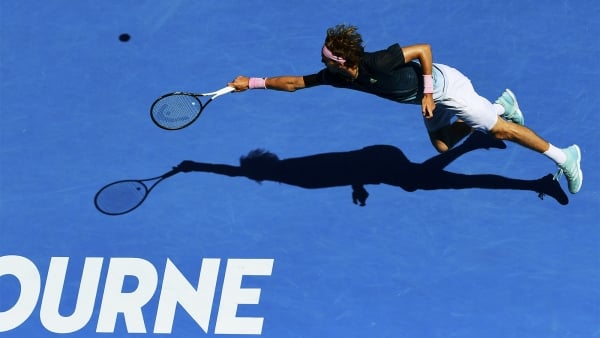
Frances Tiafoe put out Kevin Anderson and Grigor Dimitrov to make his first major quarterfinal but made no impression on Rafael Nadal, who also schooled Alex De Minaur (by the exact same score as their Wimbledon third round) and Tsitsipas for the loss of six stingy games in their semi.
No.1 Novak Djokovic put out Denis Shapovalov and Daniil Medvedev (in an attritional four-setter) but was even more severe than Nadal in his semifinal demolition of Pouille, allowing four games.
Final analysis: Djokovic v Nadal, No.1 v No.2, a rematch of their epic 2012 final, the 53rd instalment of the most titanic rivalry in tennis.
7. Ash Barty is top 10 bound
Aussie No.1 Ash Barty had all of Australia riding on her every shot as she charged into a first Grand Slam quarterfinal at her home Slam. It was Sydney Olympics flashbacks and almost Cathy Freeman-level adoration all over again.
MORE: Reflective Barty finds silver lining
Barty, 22, was the first local in the last eight since Jelena Dokic a decade ago and she had to get past former champion Maria Sharapova, who’d just rediscovered some of her old deadly form in eliminating defending champ Caroline Wozniacki.
She lost 6-1 6-4 to an untouchable Petra Kvitova but departed Melbourne Park eyeing a top-10 mark, with no ceiling on her varied, crowd-pleasing game.
8. Kvitova No. 2, fan love No. 1
Petra Kvitova experienced her first loss in a Grand Slam final but tennis was the winner for having the dual Wimbledon champion back at her best, little more than two years since knife wounds in a violent home invasion left her playing career in serious doubt.
The clean-hitting Czech blasted into the final without dropping a set, and braved three match points on her serve at 3-5 in the second set, to force a decider. Seven years since she had a shot at the No.1 ranking, the lefty shot maker was again within sight of the summit.
“I already won two years ago,” reflected the 28-year-old, on missing out on both the title and No.1. “I didn’t know if I’m going to hold the racquet again. I’m holding it, so that’s good. It’s not the end. Yeah, I be back for sure.”
Kvitova went to No.2 in the rankings but was the No.1 human interest story.
MORE: Kvitova’s win one for the true believers
9. Osaka the first Asian No. 1
No less than 11 women had a shot at clinching the No.1 ranking at Melbourne Park, including incumbent Simona Halep.
Naomi Osaka was the last woman standing, holding off Petra Kvitova 6-4 in the decider for both the Australian Open title and the No.1 spot.
Osaka is the youngest atop the rankings since Caroline Wozniacki in 1990. The generation shift that’s a perennial potential storyline in men’s tennis is a reality in the women’s game. Teenager Amanda Anisimova was the youngest quarterfinalist since 2007.
Osaka, already Japan’s first major winner, is now the first Asian to rank No.1. More truth-in-advertising at the Grand Slam of Asia-Pacific.
10. Djokovic domination a surprise ending
Across 52 instalments of the Djokovic-Nadal rivalry, the most intense in the game, nothing prepared us for the Djokovic domination of the AO2019 decider, the seamless Serb winning 6-3 6-2 6-3 to inflict Nadal’s heaviest defeat in a Grand Slam final.
Their last meeting was a gladiatorial Wimbledon semi, going 10-8 in the fifth and arguably match of the year. Their last final here seven years ago was a punishing epic just short of six hours. Sunday’s was one-sided and lightning quick (in comparison), at just over two hours. Djokovic did not lose a point on serve until he served for the first set. Nadal didn’t see a break point until mid-way through the third set, and couldn't clinch it.
Djokovic struck 34 winners (13 more than his opponent), many with almost casual ease. The 31-year-old maintains his perfect record in Melbourne Park finals, a record seventh title moving him ahead of Roy Emerson and Roger Federer. In terms of scoreline, this historic title win was Djokovic’s easiest.
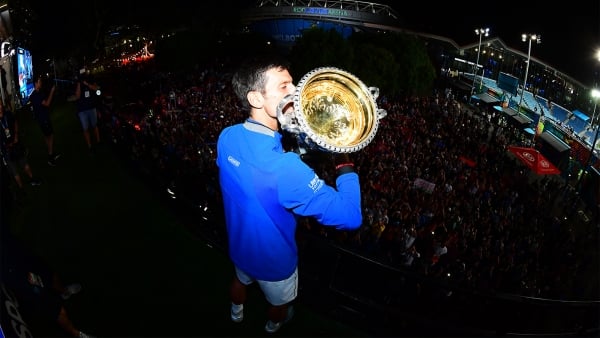
“It ranks right at the top, playing against Nadal, such an important match,” said the victor. Since his elbow surgery and fourth-round exit here a year ago, Djokovic is now champion at three of the last four majors.
The only man since Laver to hold all four majors, at Roland Garros in 2016, Djokovic could now repeat the feat. Nadal, meanwhile, drops to 1-4 in finals at his least successful Grand Slam.
“I don’t want to say I’ve figured him out because I don’t want [Nadal] to bounce back at me in the future,” Djokovic said of mastering his most significant rival. “The one that has impacted me on a personal and professional level the most in my life.”
Not with a Roland Garros rematch on the cards. But in Rod Laver Arena, Djokovic is the king.
